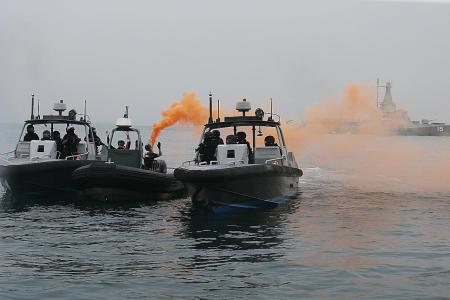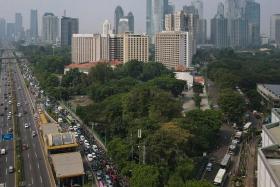'Terrorists' in Singapore waters arrested
Maritime, land agencies take part in security exercise
"Terrorists" in speedboats, suspected of smuggling arms, were intercepted in Singapore waters off Changi Coast Road, but not before two of them "escaped" to the eastern coast.
But they were swiftly arrested by officers from the Coastal Hardening Strike Force outside the National Service Resort & Country Club, who arrived on the scene in police cars with sirens blaring.
The land demonstration was a first for Exercise Highcrest, a multi-agency biennial maritime security exercise coordinated by the Singapore Maritime Crisis Centre, held from last week to yesterday.
Senior Minister of State for Defence and Foreign Affairs Maliki Osman observed this scenario play out.
The sea portion involved a Republic of Singapore Navy (RSN) Littoral Mission Vessel, two Police Coast Guard high-speed interceptors and a patrol interdiction boat.
Warning flares were fired by one of the interceptors and the patrol interdiction boat before the terrorist boats were surrounded by the vessels.
This year, Highcrest involved about 300 personnel from government agencies, including the RSN, Singapore Customs, Immigration and Checkpoints Authority, and the Maritime and Port Authority of Singapore.
A range of maritime terrorism scenarios were tested during the eight-day exercise, including a chemical attack.
The exercise took place between two Exercise Northstar drills. The first last week involved a simulated attack by gunmen at the Changi Airport MRT station, and a suicide bomber blew himself up in Changi Airport Terminal 3.
Phase 2 of Northstar will happen tomorrow at the Home Team Tactical Centre.
Colonel Nicholas Lim, the director of the National Maritime Sense-making Group, the intelligence arm of the Singapore Maritime Crisis Centre, said it is the first time Highcrest is working with Northstar.
It was done this way to see how scenarios that happen on land could impact sea operations, and vice versa.
He said: "It is important we have a presence in the maritime domain, with it being... easily accessible, so that we are able to stop people from leaving (if an attack happens on land)."
FOR MORE, READ THE STRAITS TIMES TODAY
Get The New Paper on your phone with the free TNP app. Download from the Apple App Store or Google Play Store now



